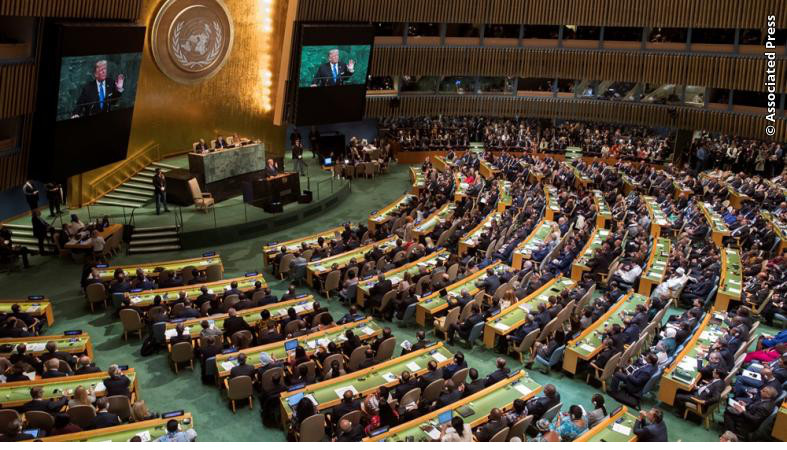In November 1985 the United Nations General Assembly endorsed the UN Basic Principles on the Independence of the Judiciary. The principles were formulated to assist Member States of the UN in their task of securing and promoting the independence of their judiciary. Consequently, governments of UN Member States were enjoined to respect these principles and accommodate them in their national laws and practice. Naturally as a Member State of the UN, Nigeria has taken several steps to ensure the independence of its judiciary. The most important of these steps, is the insertion of Section 17(e) into the 1999 Constitution of the Federal Republic of Nigeria (as amended) which guarantees the independence, impartiality and integrity of the Nigerian judiciary.
The on-going strike by the Judiciary Staff Union of Nigeria (JUSUN) has once again brought to the fore the inadequacies of Nigeria’s federalism, which has been characterised by constituent parts’ (the States), non-compliance with constitutional provisions-which often times, are products of Nigeria’s commitment to international conventions, protocols and treaties. Such actions or inactions sadly portray Nigeria as a violator of the international law principle of pacta sunt servanda (a Latin phrase meaning-agreements must be kept)
- Mastermind of Kankara abduction makes u-turn, returns to forest
- Fidelity earns N10bn profit in 3 months
JUSUN’s strike which commenced on 6th April 2021 is intended to press home their demands for the enforcement of financial autonomy in the judiciary, particularly at the state level. The union is simply demanding that the executive arm of the government henceforth (which in most states is the custodian of all funds generated by and accruable to all arms and tiers of government) credit heads of courts with such funds standing to the credit of the judiciary from the Consolidated Revenue Fund of the states and nothing more. This demand is neither convoluted nor avaricious but premised on the provisions of Section 121(3) of the Constitution and the following judicial decisions which unequivocally confirmed the autonomy of the judiciary in line with the spirit and letters of the 1999 constitution: Judiciary Staff Union of Nigeria Vs National Judicial Council and Governors of The 36 States (Suit No: FHC/CS/667/13), Olisa Agbakoba Vs Federal Government of Nigeria, The National Judicial Council and The National Assembly (Suit No: FHC/CS/63/2013) and Olisa Agbakoba Vs Attorney-General Ekiti State & 2 Others (Suit No: NAD/56/2013)
As a result of these judicial decisions, JUSUN entered into Memorandum of Understanding (MOU) with the relevant stakeholders, where the union obtained assurances of the federal and state governments’ commitment to complying with the judicial pronouncements. While the Federal Government eventually complied, the state governments reneged.
On 20th May 2020, President Muhammadu Buhari signed Executive Order No.10 whose provisions amongst others, provided for the treatment of funds accruable to state judiciaries as first-line charge and requiring such funds to be directly paid to the heads of state courts. The execution of this Order was greeted with a negative reaction by the state governors who described it as unconstitutional. Though not holding brief for the union, it is safe to say that this strike became inevitable as a result of the inability of these judicial and presidential interventions to change the stand of the State Governors.
This industrial action by JUSUN has brought renewed focus on the need for all tiers of governments in Nigeria to keep faith with the UN General Assembly Resolutions 40/32 of September 1985 and 40/146 of 13 December 1985 which places an incumbent duty on all governments and institutions in Nigeria to respect and observe the independence of the judiciary. Member States are equally obligated to provide adequate resources to enable their judiciaries function properly. Needless to say, the absence of adequate resources means an incapacitated and a dependent judiciary. Therefore, the need for a financially autonomous judiciary cannot be overemphasised.
The Nigerian Governors Forum, after series of meetings with relevant stakeholders, offered a self-serving concession which would only see to the monthly payment of certain minimum amounts to the judiciaries for their operations instead of direct allocations which is what the constitution envisages. Thankfully this offer was rejected by the union.
The Nigerian Bar Association (NBA) in consonance with the aims and objects of its constitution which includes the defence of the independence of the judiciary has resoundingly declared its total support for the cause of the union. Consequently, it has directed all branches nationwide to mobilise members and pay visits to state governors in order to press home the demand for the implementation of financial autonomy for the state judiciaries.
Borrowing from the biblical injunction in Mark 12:17 where Jesus Christ, in replying to a hypocritical and mischievous question asked by the Pharisees and Herodians, enjoined them to ‘Give back to Caesar what is Caesar’s and to God what is God’s’; yours truly dares to say that it is high time the Nigerian Governors Forum gave to Caesar what is Caesar’s
John Aku Ambi, Esq, is a legal practitioner resident in Kaduna

 Join Daily Trust WhatsApp Community For Quick Access To News and Happenings Around You.
Join Daily Trust WhatsApp Community For Quick Access To News and Happenings Around You.


